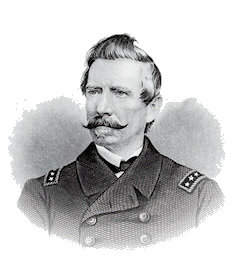Raphael Semmes[i] to Howell Cobb.
Washington, D. C, Jan’y 26th, 1861.
My Dear Sir: Permit me to remind you of the conversation we had just before you left Washington. I think States enough have gone out to determine me as to the course I shall pursue. If invited by the Confederacy of the Cotton States I will accept service in its navy and abandon my present position. The chances are that Maryland (my native State) and all the other border slave states will speedily follow you, but whether they do or not I will cast my destiny with yours if you will permit me. I am in some sort claimed as a citizen of Alabama, having resided in that state several years before I was ordered to Washington upon my present duty, and it is probable that my nomination to the new executive for a post in the navy of the new Confederacy will be made by Gov’r Fitzpatrick and other friends from that State. However this may be, may I ask you also to perform this service for me and to inform me promptly of your action and that of the new President in the premises? Messrs. Toombs, Stephens, Fitzpatrick, Clay, Curry, Sydenham, Moore, Stallworth and other good friends to whom I have written or with whom I have conversed freely on the subject will I have no doubt take pleasure in assisting you to accomplish my purpose. As you are a delegate to the convention to form the new Government I may perhaps not inappropriately say a word or two to you on the subject of the organization of your army and navy. The Southern States being planting and agricultural States and but little engaged in commerce and navigation (though doubtless their separation from the North will make them more commercial and navigating than they have hitherto been), they will require but a small naval force for several years to come ; and it strikes me also that it will be bad policy to establish a large army. I would advise therefore that both your navy and army lists be kept within very small compass. I mean the regular forces of each, or such as are to be kept on foot as well in peace as in war. If a war ensue, which I do not anticipate, your regular military establishment can be temporarily increased to meet the emergency by appointments and enlistments to continue during the war and by the commissioning of privateers and other irregular maritime forces to serve during the same period. This will enable you at the end of the war to dismiss, as a matter of course and without complaints, all the personnel of both services excepting only the small army and navy lists before referred to. I have said that I do not think we shall have a war and these are my reasons for the opinion. If the border slave states join you the old confederacy will be split nearly in half, and the idea of coercion would be simply ridiculous; if they do not join you, being retained by compromises that will satisfy them, they will be a barrier and a safeguard to you and will hold the hands of the Vandals who might otherwise be disposed to make war upon you. No slave state could possibly be an ally of the free states in a war upon slave states upon the slave question. Be cool therefore in organizing your military and naval establishments and do not consent to place too great burthens upon the shoulders of the people. It is easier to make armies and navies than to get rid of them when made, and the people will not and ought not to submit to exhorbitant taxation to support large establishments for which they will ordinarily have no use. One word more and I shall have done.
Your naval officers I suppose will be taken from the present navy list of the old government. Preserve their relative rank in their new relations. You know rank is of essence with military and naval men, and the rule I suggest to you is not only just and proper and will work well but it will put an end to all jealousies, rivalries and heartburnings. May I ask the favor of a line in reply?
[i] Lieutenant, 1S37-1855, commander, 1855-1861, United States Navy; commander and rear-admiral, Confederate States Navy, commanding the cruisers Sumter and Alabama.
From Annual Report of the American Historical Association for the Year 1911.
Raphael Semmes (September 27, 1809 – August 30, 1877) was an officer in the Confederate navy during the American Civil War. Until then, he had been a serving officer in the United States Navy from 1826 to 1860. During the American Civil War, Semmes was captain of the cruiser CSS Alabama, the most successful commerce raider in maritime history, taking 65 prizes. Late in the war, he was promoted to rear admiral and also acted briefly as a brigadier general in the Confederate States Army. His appointment or arrangement to act as a temporary brigadier general from April 5 to April 26, 1865, was never submitted to or officially confirmed by the Confederate Senate.
Howell Cobb was an American political figure. A southern Democrat, Cobb was a five-term member of the United States House of Representatives and Speaker of the House from 1849 to 1851. He also served as the 40th Governor of Georgia and as a Secretary of the Treasury under President James Buchanan. Cobb is, however, probably best known as one of the founders of the Confederacy, having served as the President of the Provisional Congress of the Confederate States.
